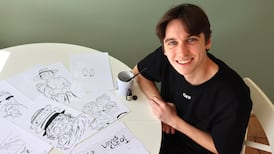X-ray machines, scalpels, syringes and blocked arteries are not the usual source material for poetry but in Patient Voices, the newly published collection of poems by patients of the Adelaide & Meath Hospital and The National Children's Hospital in Tallaght, inspiration comes from both inside and outside the hospital.
The collection, which was launched last week by poet Brendan Kennelly, is a fantastic testament to the value of creative work, and the poets, the writer-in residence, Mark Grenier, and the hospital's arts officer, Hilary Moss, deserve high praise for the quality of the finished publication.
At the launch, Brendan Kennelly said, "I was startled by the poems. I read them over and over. I read them aloud and found the magic there. This is one of the healthiest books I've ever read - a book of brave and determined humanity."
The 90 poems in the collection were written by patients aged six to 86 in all parts of the hospital from those attending the age-related day hospital to children at the National Children's Hospital school. For some patients, the experience of writing was therapeutic, helping them to come to terms with their illness. For others, it was light relief, a distraction from their worries.
Scalpel, for instance, is a group poem, written by children at the National Children's Hospital school: "I have a cutting edge, Shiny as sun reflecting on water, Cold as ice, I put pain into people, Sorry."
Reading another group poem from the children at the hospital school, Kennelly said, "the poets let the voices of external things - like syringes - live through them. This is really a spiritual book."
Patrick O'Reilly (67), who has several poems in the collection, had just retired as a logistics manager for Diageo Bailey two years ago when he had a heart attack. He was asked if he wanted to join a poetry workshop group when he was attending the cardiac rehabilitation programme. "Practically all of us had never written anything before. I looked forward to coming. It gave me confidence in myself and made me realise that retirement wasn't the end of the world."
Pete Hamilton also attended the poetry workshops during his cardiac rehabilitation programme. He says, "The workshops taught me how to find a completely different language to express myself in and helped me understand better how I was feeling in difficult emotional situations."
Prof Ian Graham, consultant cardiologist at Tallaght Hospital, says it is not uncommon for people to suffer from depression after heart surgery. "People are immortal one day and then when they have a heart attack, their self-control is taken away from them. They are treated like a child in hospital with the nurses looking after them and then they are literally sent home. It can be very devastating. These people need some way to express their distress and poetry workshops help them do that."
Mark Grenier, the poet who conducted the workshops, says the feedback from patients was tremendous - particularly from the heart patients.
"I also wondered whether children who were a bit dazed from accidents would want to join in but they did. What I was most interested in was giving them an adventure with language and a vehicle for self-expression. The writers were so open-minded. The whole experience was a real privilege for me."
The poetry workshops at Tallaght Hospital is just one strand of many projects organised by the Arts Officer, Hilary Moss. Others include art exhibitions, an orchestra in residence, a puppet-in-residence and projects which improved the design of areas such as the pastoral care corridor and colposcopy treatment rooms.
The Irish Chamber Orchestra became the first orchestra in residence of any hospital in Ireland last year. And there is an evaluation study underway to look at the impact of music therapy on the coping mechanism of patients who have had a stroke.
Prof Des O'Neill, consultant geriatrician and chairman of the arts committee at Tallaght Hospital, says, "People feel there isn't time for them and it's too busy but despite the size and appearance of the hospital, we do want to hear people's stories. There is a strong interest in narrative medicine which is the lived experience of illness.
"When people are coming to terms with loss through illness, there is also an opportunity for growth. It is this experience of growth which sustains the mission of healing," he says.
O'Neill also believes there is a value in introducing subjects from the humanities into medical degree programmes - which has not happened in Irish medical schools as yet.
"There needs to be academic rigour attached to such endeavours so that, for instance, neuroscience and music can be linked up. There also needs to be quality-of-life assessments and evaluations to arts projects in healthcare settings."
Taking an overview of arts initiatives in hospitals, he adds: "Such programmes liberate healthcare staff from a negative disease model to one which also looks at the abilities of patients. This then goes on to enhance the staff's own working experience."
O'Neill says a true holistic view of healthcare is one "in which the arts and expression of what we are as humans fit into the science and creativity of medicine and healthcare".
Both poems are reproduced with permission from Patient Voices, poems by patients of The Adelaide & Meath Hospital, Dublin, Incorporating The National Children's Hospital.
Copies are available at €5 from tel: 01 4145918 and info@amnch.ie








